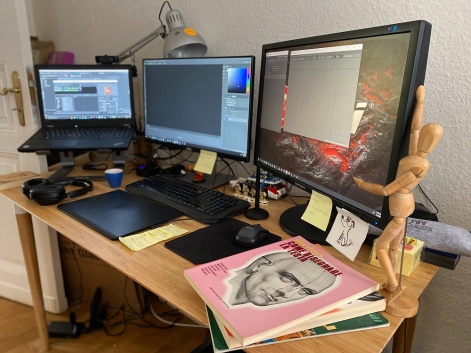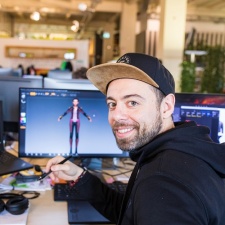The games industry plays host to a colourful cast of diverse individuals, from artists and coders to narrative designers and studio heads.
The skills to pull off these roles, however, are complex and differing, with each position requiring mastery in its field – especially in these complex times we are all living through at the minute.
To highlight some of the brilliant work that goes on behind the scenes as well as how employees around the world are adapting to the life of remote work, PocketGamer.biz is reaching out to the individuals who make up the games industry in our Jobs in Games: Remote Working series.
To kick things off, we spoke with Wooga senior 3D character artist Marco Rizzotti.
PocketGamer.biz: Can you tell us about your current role and what it entails?
Marco Rizzotti: Hi, my name is Marco Rizzotti and I'm a senior 3D character artist at Wooga. Currently, I'm working on a new game, where I'm handling the entire pipeline of the 3D characters, while closely collaborating with the character concept artist, writers and tech department for the implementation into the game.
How did you first get into games and how did you progress into this role?
Game art is now more recognised as a professional discipline rather than just a hobby or a secondary art category.Marco Rizzotti
I've been a traditional sculptor for more than 10 years, working mainly for modalism and action figure companies. In 2013, I moved to Germany and began my first job in the customer support team at a mobile games company. After two months someone noticed my sculptures on my desk and referred me to the art director. I managed to be offered an internal interview and four months later started my first contract as a trainee 3D character artist.
From that point I absorbed everything that helped me advance my skills: spending as much time as possible with the Senior Artists, asking as many questions as possible and taking the time out of hours to practice and get familiar with the pipeline.
What did you study (if anything) to get your role? What courses would you advise for aspiring professionals in the area?
I have a degree in Marketing and Communication, but I always had an enormous passion for classical art. I've been lucky enough to study in Rome and be inspired by the beautiful masterpieces of Bernini, Leonardo, Raffaello, and many others. I've learned sculpting skills from books, joining art communities and becoming an apprentice for some Italian master sculptors.
Today, you can find a crazy number of tutorials online. One that really changed my way of thinking about character design is 'Create appealing characters in 3D' by Dylan Ekren, which is available on the Mold 3D Academy platform. Several tutorials by FlippedNormals on Youtube are also pretty good.
Do you think there are any misconceptions, public or professional, surrounding your area of expertise?
About seven or eight years ago, the job of a character artist for games was not really known to people. I remember a moment when I visited my hometown in the south of Italy when I met an old schoolmate and I told him I was creating characters for computer games, to why he replied: "Well, at the beginning it's always like that, but no worries dude you will find a proper job at one point".
Today things have changed dramatically. Game art is now more recognised as a professional discipline rather than just a hobby or a secondary art category.
What advice do you have for someone looking for a job in this profession?
Build a portfolio. A good and comprehensive portfolio of your work that you keep updating as your skills develop is key. Other than that, creating games is a team effort. Being a team player, support the other disciplines and build a reliable network.
At the very beginning of my career, it really paid off to look for an internship to get a foot in the door and learn as much as possible. The chances that people will remember your work and your attitudes and ask you to stay are normally high.
How has the shift from office to remote working impacted your role, if at all?
Honestly, it hasn’t impacted my role that much. From my previous experience as a freelancer, I am comfortable working from home. Of course, it's a completely different context now and I miss the personal interaction with my teammates.
Wooga helped all of us a lot to improve our work-from-home environments, including the installation of a special budget that assigns €500 per person ($544.54), which we can use for better chairs, desks or technical equipment. Our internal communication has always been pretty organised and smooth, allowing us to still onboard new colleagues remotely.
What does your typical day look like when working remotely?
The quiet environment at home helps me to focus and I also have the feeling that meetings become a bit more efficient.Marco Rizzotti
I like to start early and the fact that I currently don't have to commute helps me with that. I normally begin at 8am where I make a plan for the day. At 10:15am my team and I meet for our virtual daily stand-up meeting and talk about what we did the day before and what our plans are for today. Between 12 and 1pm I take the time for a lunch break and after that focus on working on my characters.
Normally our office kitchen is a highly frequented place where we meet for a coffee and quick chat. Since that is not possible currently, we try to meet for a virtual coffee every day around 3:30 pm. Generally, I try to communicate a lot with the other character artist or the tech department via calls or chat in order to align. At 6pm I normally go for a run and do a workout at home.
What do you think are the biggest advantages and disadvantages of remote working?
On a personal level, working from home even increases my productivity and outcome. However, that comes with the risk of overwork. I'm a perfectionist and don't like to deliver something that I'm not 99 per cent happy with (if you are 100% happy it means that there are some fixes that you are not detecting). The quiet environment at home helps me to focus and I also have the feeling that meetings become a bit more efficient.
Having said that, I do miss going to the office and its inspiring environment. And as I mentioned already, the real-life contact with my team is probably the thing I miss the most.
Do you have any advice for others who are struggling to adjust to remote work?
Everyone's circumstances differ. There are a lot of different functions, personalities and procedures, which makes it hard to give advice that is applicable to everyone.
In general, I would suggest taking some time and structuring your workday including daily routines. I have set up my home office in the exact same way as in the office. This helps my brain to process in the same way it does in the office and it cuts off the time needed for adapting to a new setting.
After the pandemic ends and if you were given the choice, would you prefer to continue working remotely or go back to working in an office?
I think this crisis will certainly change the way we live and the way we work. It demonstrates that working remotely is possible for industries like ours. It also comes with the side effect that pollution reduces since people are commuting and travelling less. At the same time working from home can also be challenging for some people or specific professions.

When getting back to normal, I think more flexible policies for remote work would be great so that everyone can simply decide depending on their tasks and workload if it makes more sense to work from home or come to the office at a given time.
PG Connects Digital #1 is the best of our Pocket Gamer Connects conference in an online form, with an entire week of talks, meetings, and pitch events taking place from April 6th to the 10th. You can read up on all the tracks taking place through the week here.





















